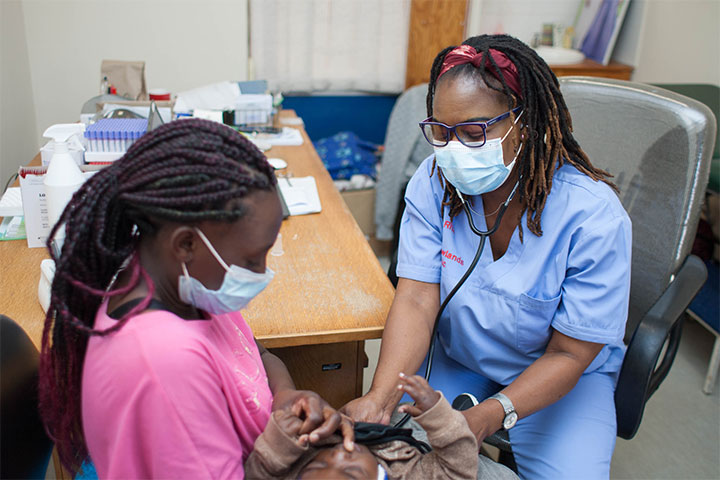Various key performance indicators show that the treatment of HIV at Newlands Clinic continued to be successful in 2022. In 92 % of our patients, the HI virus was no longer detectable in the blood. The mortality and lost to follow-up rates were also very low at around 1% each. But the effect of the treatment isn’t limited to our patients. HIV mother-to-child transmission is prevented by successful treatment, and the number of newly infected children has been decreasing steadily for years. Currently, only 35 children between 0 and 5 years of age with a positive diagnosis are still in treatment at Newlands Clinic: a great preventive success. At the end of 2022, Newlands Clinic was treating 7,720 patients and had thus admitted around 500 new people over one year.
The challenge of cancer
What’s currently presenting us with difficulties is HIV-associated cancers. This is because people with HIV develop cancer more often, regardless of the success of the therapy. While we have the HIV disease well under control in our patients, the increased risk of cancer threatens to worsen their state of health again. This is especially problematic because the public health system is hardly able to treat people with cancer. We often have to organise the necessary therapies in the private sector, which leads to additional costs. Newlands Clinic therefore pays special attention to regular cancer screening and effective therapy.
Dangerous high-risk viruses in women
Cancer has also been a major concern for our women’s health centre. Cervical cancer is still the most common type of cancer among women in Zimbabwe, and HIV-positive women have a massively higher risk of developing it. Newlands Clinic therefore pursues a systematic screening and examination programme. Of the 2,200 or so women examined, more than half tested positive for high-risk variants of the human papillomavirus. This virus causes over 90 % of cervical cancers worldwide. Regular screening can identify cervical disease and precancerous lesions before cancer becomes invasive.
Comprehensive treatment helps therapy adherence
Because our patients live in difficult socioeconomic situations, the clinic complements medical treatment with food assistance, educational services, and psychological support. It helps our patients to stick to their therapy with discipline. Food assistance was of particular importance last year. Food prices rose continuously owing to inflation and the maize harvest was sparse. That is why in 2022, Newlands Clinic provided food to an average of over 600 families per month, compared with around 450 families normally. We distributed 260 tonnes of maize flour and almost 14,000 jars of peanut butter. Last year, we also augmented our education programme with an empowerment project for men. Many of our male HIV patients live in extraordinarily difficult circumstances. They can barely support their families and are unemployed. In the empowerment programme they build up their own business, generate an income and thus regain their independence.


